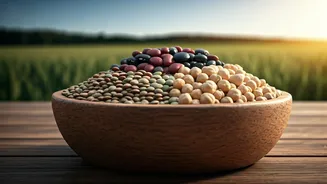The Kidney's Role
The kidneys are vital organs, working tirelessly to filter waste and excess fluids from your blood. They produce urine, which carries these waste products
out of the body. Maintaining kidney health is essential for overall wellness, as it helps regulate blood pressure, balance electrolytes, and activate vitamin D. Kidneys also release hormones that contribute to red blood cell production. A diet rich in kidney-friendly foods is an easy way to support these essential functions and keep your body running smoothly. By incorporating these foods into your daily routine, you can proactively support your kidney health, reducing the risk of kidney-related issues and enhancing your overall vitality.
1. Cranberries
Cranberries are renowned for their ability to combat urinary tract infections (UTIs), which, if left untreated, can potentially affect the kidneys. Cranberries contain compounds that prevent bacteria from adhering to the urinary tract walls, helping to flush them out before they can cause harm. While cranberries are beneficial, consuming them in excess can lead to digestive issues for some individuals. Therefore, moderation is key. They can be enjoyed in various forms, such as fresh, frozen, or as unsweetened juice. Incorporating cranberries into your diet can offer a proactive approach to kidney health, helping to keep UTIs at bay and supporting the kidneys' function.
2. Red Bell Peppers
Red bell peppers are rich in antioxidants and low in potassium, making them an excellent choice for kidney health. They are packed with vitamins, including vitamin C, which supports the immune system and helps to protect against cellular damage. They also contain lycopene, an antioxidant linked to a reduced risk of certain cancers. The low potassium content in red bell peppers is particularly beneficial for individuals with kidney issues, as kidneys often struggle to manage potassium levels effectively. They can be added to salads, stir-fries, or enjoyed as a snack. Including red bell peppers regularly can contribute to a diet that supports kidney function and reduces the burden on these vital organs.
3. Apples
Apples, often celebrated for their numerous health benefits, are also supportive of kidney health. They are high in fiber, which aids in removing waste and toxins from the body. Furthermore, apples contain antioxidants that shield the kidneys from oxidative stress. The fiber content in apples also helps to reduce cholesterol levels, which can indirectly support kidney function by improving overall cardiovascular health. Apples can be consumed in various forms such as raw, cooked, or as part of a smoothie. Incorporating apples into your diet provides a simple, yet effective, way to support your kidney health and overall well-being.
4. Cabbage
Cabbage, like red bell peppers, is a low-potassium vegetable that is kind to the kidneys. Cabbage is rich in vitamins C, K, and B6, along with fiber, contributing to the overall well-being of the kidneys. These nutrients work to neutralize harmful free radicals. The fiber helps in the removal of toxins from the body. Cabbage is also very versatile; it can be eaten raw in salads, fermented as sauerkraut, or cooked in a variety of dishes. Adding cabbage to your diet is a simple and practical way to incorporate a kidney-friendly food and support your body's natural detoxification processes.
5. Olive Oil
Olive oil is a healthy fat that can contribute to kidney health. It is a source of oleic acid, an anti-inflammatory compound. Olive oil's anti-inflammatory properties can help reduce the strain on the kidneys and protect against kidney damage. It is also a heart-healthy option, which can indirectly support kidney function. Olive oil should be consumed in moderation. It can be used in salad dressings, cooking, or as a finishing touch to dishes. Choosing olive oil over other fats can make a positive contribution to your kidney health, helping to promote its long-term well-being.













